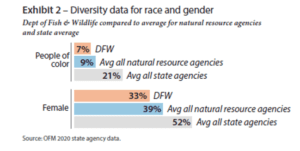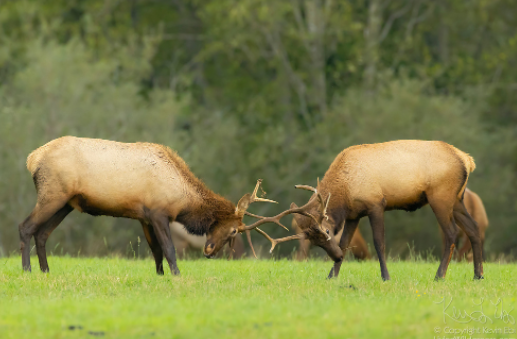In Part II of our summary of the Washington State Auditor’s Report that was released Monday, we explore the auditor’s description of the “good ole’ boys” club at the Washington Department of Fish and Wildlife: a hostile workplace that discriminates against women, bullies female employees, and refuses to hold senior members of the “club” accountable for their actions.
Please read: Washington Auditor’s Report Part I: Legal and Ethical Violations, Fear of Retaliation, and Disregard of Science
Hostile, Discriminatory Workplace
- 21% of survey respondents said they had directly experienced workplace bullying, including yelling, demeaning comments or intimidation in the last year, while 30% said they had witnessed it happening to someone else.
- 25% of the employees interviewed reported gender discrimination at the Department. Of the 172 survey respondents who said they experienced aggressive behavior, 20 percent said they believed gender was a factor.
The “good ole’ boys” club is alive and well at WDFW. Only one-third of WDFW employees are women, compared to more than half of the workforces in other state agencies. Meanwhile, only 7% of agency employees are people of color, compared to 21% in all state agencies. WDFW employees told the auditors that women face a number of obstacles in the Department, including having to work harder than men, having their opinions ignored while more weight was given to the input of their male counterparts, being offered fewer training opportunities, and being treated with less respect than their male colleagues.Meanwhile, WDFW employees reported that the workplace in general was hostile and aggressive, with one third of respondents indicating that they had either experienced or witnessed workplace bullying (many reported both). Employees described this behavior in interviews:
WDFW employees told the auditors that women face a number of obstacles in the Department, including having to work harder than men, having their opinions ignored while more weight was given to the input of their male counterparts, being offered fewer training opportunities, and being treated with less respect than their male colleagues.Meanwhile, WDFW employees reported that the workplace in general was hostile and aggressive, with one third of respondents indicating that they had either experienced or witnessed workplace bullying (many reported both). Employees described this behavior in interviews:
“I’ve been yelled at, cussed at by my supervisor. I mean, screamed at.”
“It was a person much larger than me, basically threatening my job and then stepping into me and pushing his finger at my chest.”
Employees have reported a wide range of hostile behavior to Washington Wildlife First. Some who have told us that they avoided the office or worked out of their cars because they were afraid of their colleagues or supervisors. They tell us management not only ignores their reports of sexual harassment, bullying and intimidation, but that reporting this behavior only results in retaliation—including increasing the threatening behavior, attempting to get the employee fired, or trying to publicly humiliate the victim.
Lack of Accountability
- Only 44% of survey respondents reported that managers were held accountable when they behaved inappropriately.
Many employees told the auditors that they were frustrated that people who behaved unprofessionally had been promoted to higher levels of management. In fact, employees told auditors that one of the people involved in high-profile reports of sexual abuse and harassment was now back in the upper echelons of senior management:
“That was a big deal when bad things were happening… [An employee] got a slap on the wrist, temporarily demoted, and is now back on the top. It just kind of feels icky…that doesn’t settle well with some of us locally.”
Employees told the auditors that this lack of accountability was a byproduct of a “good ol’ boys” club of favoritism, and that management’s response to the report of a workplace problem is often to transfer the victim.
Are WDFW Changes Just More of the Same?
The auditor’s report gives WDFW leadership the benefit of the doubt that it has made a “commitment to change,” and has taken a “number of important steps” to address concerns about the agency’s culture. But those inside the Department tell a different story.
They say recent changes such as the Department’s touted “Red Flag” reporting system are mere window dressing. They have filed Red Flag reports that go ignored for months, only to be “investigated” by the same HR department that has whitewashed previous complaints.
Insiders tell us that many of the Department’s “culture” changes are more about silencing dissent than fixing problems. They say management has continued to follow the pattern identified by the auditor’s report: When employees report illegal, unethical, or inappropriate behavior, the reaction is to take swift action—not to investigate the problem and root out those responsible for the behavior, but to harass, bully, and retaliate against those who reported it. In fact, employees reported—to both us and the auditors—that they suffered retaliation just for speaking to the auditors.
Indeed, employees report that WDFW management’s first response upon reviewing the draft auditor’s report at the beginning of the year was to go on the attack. Rather than taking the findings to heart and attempting to fix them, management immediately tried to undermine the report—criticizing the auditors’ methods, study design, and sample size, and demanding additional reviews and revisions that delayed the release of the report for at least eight months. This has led many to question whether the report released on Monday is a watered-down version of the original draft.
We know most WDFW employees value science, respect the wildlife they are supposed to protect, and take their responsibility as public trustees seriously. But they cannot do their jobs in a hostile atmosphere where unethical and illegal behavior is tolerated, bullying and discrimination are common, and employees are punished for attempting to stand up for what is right.
As one former employee reported to us:
“They prevented me from doing my job and did everything they could to make me as ineffective as possible. That cost the agency, the taxpayers, and the scientific community. Removing me was more important than getting our jobs done.”
“I was disappointed that the audit report did not make the connection between these behaviors and the actual cost on the ground, because when you are being treated like this, you cannot function.”
Washington Wildlife First stands with the biologists, enforcement officers, conflict specialists, and other employees who are trying to improve WDFW, hold its management accountable, and force the agency to become a responsible manager of the state’s wildlife. Many eyes will be on the Fish and Wildlife Commissioners to see how they respond to this report, and if they are willing to take a stand on behalf of their own employees.
